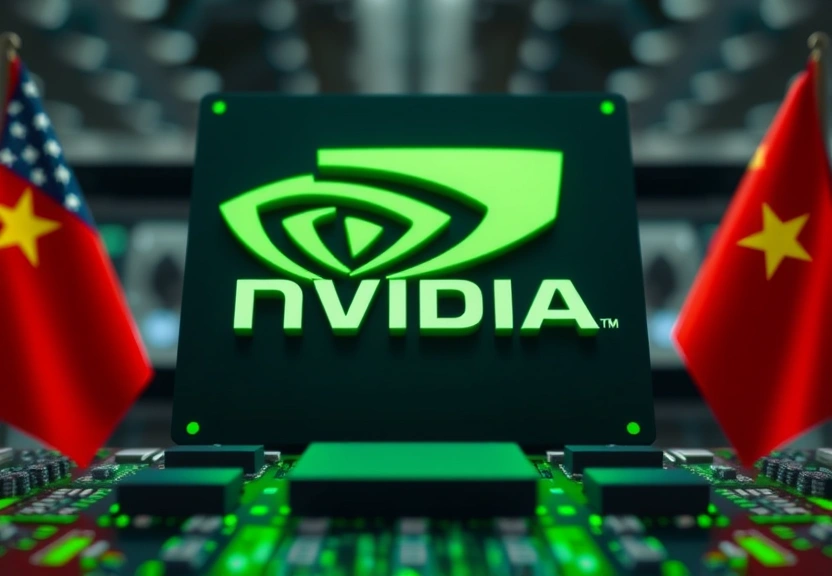Nvidia Gains US Approval to Export Chips to China After Trump Meeting
In a significant development for the tech industry, Nvidia has received approval from the United States government to export its chips to China. This decision comes on the heels of a meeting between Nvidia executives and former President Donald Trump, where concerns surrounding technology transfer and national security were discussed. The approval marks a pivotal moment for Nvidia, allowing it to tap into one of the largest markets for semiconductors while navigating the complexities of US-China relations.

Nvidia, a leader in graphics processing units (GPUs) and artificial intelligence (AI) technology, has been at the forefront of innovation in the semiconductor industry. The ability to export its chips to China is crucial for Nvidia, given the country’s burgeoning tech sector and its demand for advanced computing solutions. This article delves deeper into the implications of this approval, the context of the Trump meeting, and its potential impact on both Nvidia and the broader semiconductor market.
The Context of the Approval
The approval for Nvidia to export chips to China comes amid heightened tensions between the US and China regarding technology and trade. The Biden administration has been scrutinizing technology exports to China, citing national security concerns. However, the decision to greenlight Nvidia’s exports indicates a potential shift in policy or at least a nuanced approach to managing tech relationships with China.
Implications of the Trump Meeting
Former President Trump has been a vocal critic of China’s trade practices, particularly concerning intellectual property theft and technology transfer. During his administration, several measures were implemented to restrict American companies from engaging in business with Chinese firms, especially in the technology sector. However, the recent meeting between Trump and Nvidia executives suggests a possible re-evaluation of these stances.
The discussions likely revolved around the importance of maintaining a competitive edge in the global semiconductor market while addressing concerns about national security. By securing this approval, Nvidia may have successfully navigated the political landscape, balancing the need for growth in China with the necessity of safeguarding US interests.
Impact on Nvidia’s Business Strategy
The ability to export chips to China opens up new avenues for Nvidia’s business strategy. With China being one of the largest consumers of technology, this approval is expected to significantly enhance Nvidia’s revenue and market share in Asia. The following points outline the potential impacts on Nvidia’s business:
- Increased Revenue: Access to the Chinese market can lead to substantial sales growth for Nvidia, especially in sectors like gaming, AI, and data centers.
- Market Expansion: Nvidia can further penetrate the Chinese tech ecosystem, fostering partnerships with local companies and developers.
- Innovation Boost: Working closely with Chinese firms can enhance Nvidia’s R&D efforts, leading to innovative products tailored to the local market.
- Competitive Advantage: By maintaining a presence in China, Nvidia can stay ahead of competitors who might face stricter export restrictions.
Challenges Ahead for Nvidia
Despite the approval, Nvidia faces several challenges as it moves forward with its export plans. The semiconductor market is highly dynamic, and several factors could influence Nvidia’s operations in China.
Geopolitical Tensions
The ongoing geopolitical tensions between the US and China pose a significant risk for Nvidia. Any shifts in policy from the US government could impact future exports. Nvidia must remain vigilant and adaptive to changing regulations and trade policies.
Competition in the Chinese Market
The Chinese semiconductor industry is rapidly developing, with local companies investing heavily in research and development. Nvidia will face stiff competition from domestic firms that aim to reduce reliance on foreign technology. To maintain its competitive edge, Nvidia needs to continuously innovate and offer superior products.
Future Prospects for the Semiconductor Industry
The approval for Nvidia to export chips to China is not just a win for the company; it also signals potential growth for the entire semiconductor industry. As global demand for chips continues to rise, especially in AI and machine learning applications, several trends are expected to shape the market in the coming years.
Growth in AI and Machine Learning
AI and machine learning are becoming integral to various sectors, including healthcare, finance, and logistics. Nvidia’s chips are critical for powering these technologies, and their availability in the Chinese market could accelerate AI adoption across industries.
Increased Investment in Semiconductor Manufacturing
As demand for chips grows, there will likely be increased investment in semiconductor manufacturing, not just in the US but globally. Countries may prioritize building their manufacturing capabilities to ensure a steady supply of semiconductors, thus reducing dependency on foreign imports.
Frequently Asked Questions (FAQ)
1. What specific chips has Nvidia been approved to export to China?
While the specific models have not been disclosed, the approval primarily pertains to Nvidia’s high-performance GPUs and AI chips that are in demand in various sectors within China.
2. How will this approval affect Nvidia’s stock price?
The approval is likely to have a positive impact on Nvidia’s stock price as it opens up new revenue streams. However, market reactions can vary based on broader economic conditions and geopolitical developments.
3. What are the potential risks associated with exporting chips to China?
Potential risks include geopolitical tensions that may lead to sudden changes in export regulations, competition from Chinese firms, and challenges related to intellectual property protection.
4. How does this approval align with US-China trade relations?
This approval indicates a complex balancing act in US-China trade relations, where the US government is recognizing the economic benefits of technology exports while still being cautious about national security concerns.
5. What steps is Nvidia taking to address potential security concerns?
Nvidia is likely implementing stringent compliance measures and engaging in constant dialogue with regulatory bodies to ensure that its exports adhere to US laws while safeguarding national security interests.
Conclusion
Nvidia’s recent approval to export chips to China marks a significant milestone for the company and the semiconductor industry at large. By capitalizing on this opportunity, Nvidia can strengthen its position in a vital market while navigating the complexities of international trade. However, the road ahead is fraught with challenges, and Nvidia must remain agile to adapt to the evolving landscape. As the demand for advanced technology continues to grow, the implications of this approval will resonate throughout the industry, shaping the future of tech commerce between the US and China.
📰 Original Source
Este artigo foi baseado em informações de: https://www.investing.com/news/stock-market-news/us-licenses-nvidia-to-export-chips-to-china-after-ceo-meets-trump-ft-reports-4181584


